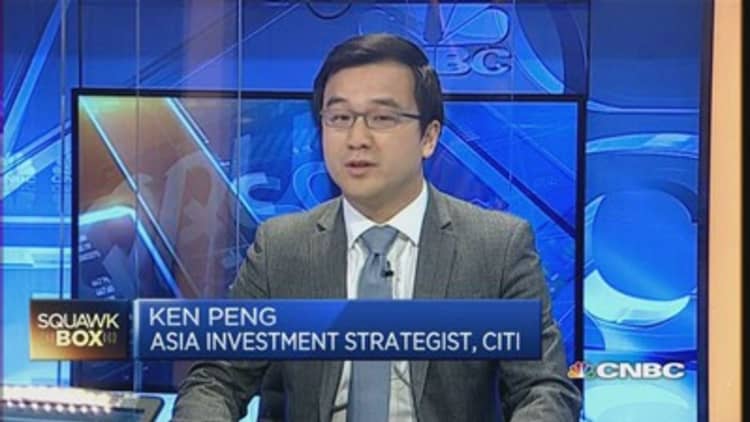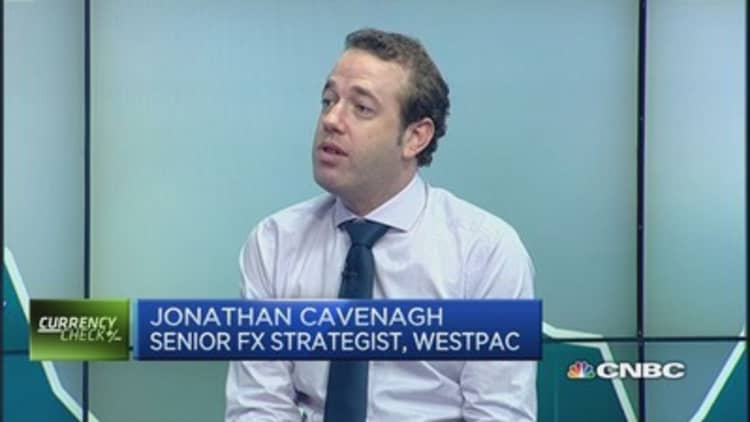Asian stocks mostly advanced on Thursday, with Tokyo and Seoul bourses ending at multi-year highs, despite a private survey showing China's manufacturing activity at a one-year low.
HSBC's preliminary reading of China's factory activity for April came in at 49.2, compared with a Reuters forecast for a 49.6 print. Last month, government data showed the official purchasing managers' index (PMI) edged up to 50.1, better than HSBC's final PMI, which came in at 49.6 indicating the country's vast manufacturing sector in contraction. The 50-point level separates an expansion in activity from a contraction.
Overnight, U.S. stocks closed about half a percent higher, ending a day of choppy trade as investors weighed mixed earnings and signs of strength in the housing market.
Mainland indices choppy
The less-than-stellar manufacturing data sparked volatility in Chinese markets; the Shanghai Composite closed up 0.4 percent after transcending between gains and losses, while Hong Kong's Hang Seng index closed down 0.4 percent after rising as much as 280 points in the morning session.
Steelmakers and media-related stocks were among top gainers; Baotou Steel and Shanghai Oriental Pearl Group elevated 2.8 and 10 percent each.
Financial plays were among those trading on the negative side; Bank of China sagged 1.2 percent, while Agricultural Bank of China and Industrial and Commercial Bank of China eased nearly 1 each.
In Hong Kong, casino plays were the main laggards; Sands China led losses with a plunge of 2 percent, while Melco Crown and Galaxy Entertainment fell 1.6 and 0.9 percent each.
Equity markets in the world's second-biggest economy has soared about 80 percent over the past six months, even as the country's economy slowed to a six-year low of 7 percent growth in the first quarter. According to a commentary published by state media People's Daily newspaper, China's bull market "has just begun" and the surge in share prices "has support from China's grand development strategy and economic reforms."

Nikkei gains 0.3%
Japan's Nikkei 225 continued its advance above the 20,000 mark on Thursday, finishing at a 15-year high for the second straight session.
"The Nikkei has rallied 33 percent in the past six months and [that] is down to the fact the Bank of Japan (BoJ) and the Abe government are working on the same page with mass fiscal and monetary policy stimulus," Stan Shamu, IG market strategist, wrote in a note. "What looks like taking the Nikkei higher still is signs the BoJ is considering even more stimulus as it fails to reach its 2 percent inflation target within the allotted time frame of two years."
Brokerage houses and insurers continued to draw buy orders from investors for the second straight session; Nomura Holdings and Daiwa Securities jumped 2.9 and 2.5 percent each.
Sony fell 1.6 percent, losing earlier upward momentum from news that it is raising its earnings estimates for the second time in three months due to better sales of video games and digital cameras.
Read MoreBribery scandal is good news for this Korean health drink
Kospi jumps 1.4%
South Korea's benchmark Kospi index climbed up steadily throughout the day to finish at a new three-and-a-half-year high, thanks to a slew of better-than-expected corporate results.
LG Display rallied nearly 3 percent after reporting its best quarterly profit in more than four years late Wednesday. SK Hynix closed up 1.2 percent following the announcement of a 50.2 percent rise in January-March operating profit from a year earlier, beating market expectations.
Hyundai Motor delivered a better-than-consensus first-quarter net profit of 1.91 trillion won, but the figure is a 1 percent drop from a year earlier. Shares of the carmaker firmed up 3.2 percent.
Meanwhile, South Korea's economy beat expectations to expand 0.8 percent on-quarter over the January-March period, a pick-up from the 0.3 percent in the preceding quarter, government data released before the market open showed. On an annual basis, the country grew 2.4 percent in the first quarter, matching a Reuters forecast but marking the slowest growth since the same quarter in 2013.

ASX adds 0.1%
Australia's S&P ASX 200 index managed to eke out marginal gains in the final hour of trade, helped by a bounce in miners which helped to offset the impact of fresh disappointing data from China - the country's largest trading partner.
Miners cheered the rally in iron ore prices overnight, providing some support for the resource-heavy bourse. Fortescue Metals, which launched an offering for $1.50 billion of senior secured notes early Thursday, surged 9.7 percent. Rio Tinto and BHP Billiton advanced 2 and 2.6 percent each, while BC Iron soared 53.9 percent.
Banking heavyweights extended losses, still hurt by Wednesday's first-quarter inflation data which did not add to the case of a May rate cut. National Australia Bank led losses with a 0.7 percent slump, while Westpac, Australia & New Zealand Banking and Commonwealth Bank of Australia made losses between 0.3 and 0.7 percent.
Read MoreWhy iron-ore won't snatch Australia's AAA
Indian markets down
Indian shares crept down into negative territory, reversing a higher open on Thursday, with the 50-share Nifty and BSE Sensex down 0.4 and 0.6 percent, respectively.
The country's second-biggest private lender HDFC Bank slipped 0.1 percent, throwing away a 0.7 percent gain earlier, after seeing its net profit rose 20.6 percent in the March quarter, slightly below expectations.
Nifty-listed Cairn India posted a fourth-quarter loss, compared to a profit in the preceding quarter. Shares of the oil and gas exploration and production company closed down 2.6 percent.

